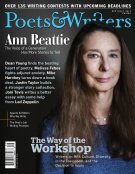It is no secret that MFA programs across the country have a way to go to ensure that their workshops are filled with racially and ethnically diverse faculty and students. Junot Díaz’s account of being a lone writer of color in his MFA program at Cornell University, “MFA vs. POC,” which appeared on the New Yorker’s Page-Turner blog in April 2014, drew a flood of stories from writers who face similar frustration. The recent deaths of unarmed African Americans in Charleston, South Carolina; Ferguson, Missouri; New York City; Sanford, Florida; and in communities throughout the United States have stirred in many writers an urgent desire to examine the ways in which a racialized culture informs our art—in the way we write, read, and respond to racial complexities observed in the world.
MFA programs are uniquely positioned to address such topics. But for many the path forward—if pursued at all—remains murky, contested, and fraught. In “The Student of Color in the Typical MFA Program,” published this past April in Gulf Coast, David Mura writes, “The divide between the way whites and people of color see the social reality around them is always there in our society…. Creative writing involves the very description of that reality, and so the gulf between the vision of whites and people of color is very present right there on the page. And so, conflict ensues.”
One program currently exploring these questions is the MFA Program for Writers at Warren Wilson College, near Asheville, North Carolina. Founded in 1971 by poet Ellen Bryant Voigt, the country’s first low-residency program is known for its rigorous standards of textual examination and artistic integrity. Its pedagogical model, by now well refined, is nonetheless exercising its flexibility to welcome a more direct conversation among faculty and students about the intersection of culture and craft.
“The MFA landscape has altered considerably over the forty years of our existence,” says director Debra Allbery. “Our strategies must necessarily shift too—as literature changes, and as the culture changes.”
Voigt agrees. “We’ve certainly seen an increased urgency among individual student writers to locate themselves and their work within the evolving culture,” she says. For some, that urgency comes from self-identification with a particular ethnic or racial heritage. Others want to explore race as a means, as Voigt says, “to expand imaginative empathy without encroachment or appropriation.”
The program seeks to explore these questions the way it explores nearly all questions that arise for the writer: through rigorous study of craft. “Craft provides the language and tools through which we identify, articulate, and address all challenges we face in our poetry and fiction,” says Allbery. “As our program becomes more diverse, we’ve also been addressing these questions, during the residency when the community gathers, in multiple formats.”
During the program’s residency this past July, Warren Wilson MFA faculty members Lan Samantha Chang, David Haynes, A. Van Jordan, Monica Youn, and C. Dale Young presented “Shadowboxing: A Faculty Panel on the Intersections of Culture and Craft.” Chang, who is also the director of the Iowa Writers’ Workshop; Haynes, the director of the creating writing program at Southern Methodist University in Dallas; Jordan, who teaches at Rutgers University in Newark, New Jersey; Youn, who teaches at Princeton University; and Young, who currently administers his own medical practice and practices medicine full-time, discussed their personal struggles regarding writing and identity, as well as the role of literary institutions in addressing (or perpetuating) these problems.
For many students, the mere occasion of the faculty panel sends a powerful message. “Knowing that we have the institutional support to engage with these thorny questions makes me feel that there is more possibility for dialogue, vulnerability, risk, and learning,” says poet and Warren Wilson student Sarah Pemberton Strong.
Fiction student Chantal Aida Gordon agrees. “The lack of diversity we see in MFA programs and in what gets published—and the often flat, cliché treatment of characters of color in contemporary literature—are truly scandalizing,” she says. “Student and faculty panels like the ones at Warren Wilson are a step in the right direction. But we have a long way to go.”
In a separate discussion led by students, writers were asked to speak frankly about their concerns, anxiety, or guilt. “I worry that my ignorance will get in the way of my intent to do no harm,” wrote one student in an anonymous prompt. Another wrote, “I worry that I don’t know how to write about my own people.” The message was clear. No one—faculty or students, white writers or writers of color—is immune to these struggles.
Meanwhile, recruiting more faculty and students of color to the program remains “a high priority,” says Allbery, who admits that that reality has been slow in coming. A reception sponsored by the Warren Wilson MFA program at the 2015 Association of Writers and Writing Programs conference in Minneapolis specifically sought prospective students of color (a reception it plans to repeat at the 2016 conference in Los Angeles), and the program’s Holden Fund for Diversity has recently expanded to offer more grants for admitted students of color who demonstrate financial need.
What advice does Allbery have for other programs wanting to address these questions? “Listen,” she says. “An MFA program is a living thing, and a constantly adaptive organism. We invite feedback from our students. We respond. Mutual respect and aligned aims fuel every conversation. An MFA program dedicated to its students’ development has to keep channels of communication open.”
With practice, many in the program hope that these conversations will become easier—both to engage in as a community and to apply to one’s own work. In the meantime, many welcome the necessary difficulty. “I want more conversations like this,” one student wrote following the panel. “I want discussions to be honest and truthful and hard.”









